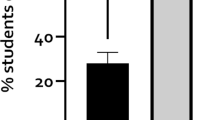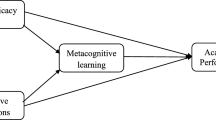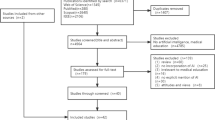Abstract
Purpose
Given the significance of the US Medical Licensing Exam (USMLE) Step 1 score moving from a 3-digit value to pass/fail, the authors investigated the impact of the change on students’ anxiety, approach to learning, and curiosity.
Method
Two cohorts of pre-clerkship medical students at three medical schools completed a composite of four instruments: the State-Trait Anxiety Inventory, the revised two-factor Study Process Questionnaire, the Interest/Deprivation Type Epistemic Curiosity Scale, and the Short Grit Scale prior to taking the last 3-digit scored Step 1 in 2021 or taking the first pass/fail scored Step 1 in 2022. Responses of 3-digit and pass/fail exam takers were compared (Mann–Whitney U) and multiple regression path analysis was performed to determine the factors that significantly impacted learning strategies.
Results
There was no difference between 3-digit (n = 86) and pass/fail exam takers (n = 154) in anxiety (STA-I scores, 50 vs. 49, p = 0.85), shallow learning strategies (22 vs. 23, p = 0.84), or interest curiosity scores (median scores 15 vs. 15, p = 0.07). However, pass/fail exam takers had lower deprivation curiosity scores (median 12 vs. 11, p = 0.03) and showed a decline in deep learning strategies (30 vs. 27, p = 0.0012). Path analysis indicated the decline in deep learning strategies was due to the change in exam scoring (β = − 2.0428, p < 0.05).
Conclusions
Counter to the stated hypothesis and intentions, the initial impact of the change to pass/fail grading for USMLE Step 1 failed to reduce learner anxiety, and reduced curiosity and deep learning strategies.



Similar content being viewed by others
References
Barone MA, et al. Summary report and preliminary recommendations from the Invitational Conference on USMLE Scoring (InCUS), in Invitational Conference on USMLE Scoring (InCUS) Burlington, VT. 2019;p. 20.
Tackett S, et al. Student well-being during dedicated preparation for USMLE Step 1 and COMLEX Level 1 exams. BMC Med Educ. 2022;22(1):16–16.
Dyrbye LN, et al. Medical school strategies to address student well-being: a national survey. Acad Med. 2019;94(6):861–8.
Dyrbye LN, et al. A multi-institutional study exploring the impact of positive mental health on medical students’ professionalism in an era of high burnout. Acad Med. 2012;87(8):1024–31.
Humphrey HJ, Woodruff JN. The pass/fail decision for USMLE Step 1-next steps. JAMA. 2020;323(20):2022–3.
Quek TT, et al. The global prevalence of anxiety among medical students: a meta-analysis. Int J Environ Res Public Health. 2019;16(15).
Dunn LB, Iglewicz A, Moutier C. A conceptual model of medical student well-being: promoting resilience and preventing burnout. Acad Psychiatry. 2008;32(1):44–53.
Ward PJ. Influence of study approaches on academic outcomes during pre-clinical medical education. Med Teach. 2011;33(12):e651–62.
Cipra C, Muller-Hilke B. Testing anxiety in undergraduate medical students and its correlation with different learning approaches. PLoS ONE. 2019;14(3): e0210130.
Hattie JAC, Donoghue GM. Learning strategies: a synthesis and conceptual model. NPJ Sci Learn. 2016;1:16013.
Newble DI, Entwistle NJ. Learning styles and approaches: implications for medical education. Med Educ. 1986;20(3):162–75.
Schumacher DJ, Englander R, Carraccio C. Developing the master learner: applying learning theory to the learner, the teacher, and the learning environment. Acad Med. 2013;88:1635–45.
Litman JA. Interest and deprivation factors of epistemic curiosity. Personality Individ Differ. 2008;44(7):1585–95.
Richards JB, Litman J, Roberts DH. Performance characteristics of measurement instruments of epistemic curiosity in third-year medical students. Med Sci Educ. 2013;23(3):355–63.
Berlyne DE. A theory of human curiosity. Br J Psychol. 1954;45(3):180–91.
Chou CM, Kellom K, Shea JA. Attitudes and habits of highly humanistic physicians. Acad Med. 2014;89(9):1252–8.
Duckworth A, Gross JJ. Self-control and grit: related but separable determinants of success. Curr Dir Psychol Sci. 2014;23(5):319–25.
Isenberg GA, et al. The relationship between grit and selected personality measures in medical students. Int J Med Educ. 2020;11:25–30.
Lee DH, Reasoner K, Lee D. Grit: what is it and why does it matter in medicine? Postgrad Med J. 2023;15;99(1172):535–41.
Jumat MR, et al. Grit protects medical students from burnout: a longitudinal study. BMC Med Educ. 2020;20(1):266.
Miller-Matero LR, et al. Grit: a predictor of medical student performance. Educ Health (Abingdon). 2018;31(2):109–13.
Park D, et al. Fostering grit: perceived school goal-structure predicts growth in grit and grades. Contemp Educ Psychol. 2018;55:120–8.
Lee D, et al. The relationships between grit, burnout, and demographic characteristics in medical students. Psychol Rep. 2022; Apr 14:332941221087899.
Wilkinson T. Pass/fail grading: not everything that counts can be counted. Med Educ. 2011;45(9):860–2.
LePine JA, LePine MA, Jackson CL. Challenge and hindrance stress: relationships with exhaustion, motivation to learn, and learning performance. J Appl Psychol. 2004;89:883–91.
Brenneisen Mayer F, et al. Factors associated to depression and anxiety in medical students: a multicenter study. 2016;16(1):472–6920.
Biggs JC. The revised two-factor Study Process Questionnaire: R-SPQ-2F. Br J Educ Psychol. 2001;71:133–49.
Lauriola M, et al. Epistemic curiosity and self-regulation. Personality Individ Differ. 2015;83:202–7.
Binu KG, et al. Influence of epistemic curiosity on the study approaches of first year engineering students. Procedia Comput Sci. 2020;172:443–451.
Richards JB, Litman JA, Roberts DH. Performance characteristics of measurement instruments of epistemic curiosity in third-year medical students. Med Sci Educ. 2013;23:355–63.
Musumari PM, et al. Grit is associated with lower level of depression and anxiety among university students in Chiang Mai, Thailand: a cross-sectional study. PLoS ONE. 2018;13(12): e0209121.
Hilliard RI. How do medical students learn: medical student learning styles and factors that affect these learning styles. Teach Learn Med. 1995;7(4):201–10.
Chen DR, et al. Student perspectives on the “Step 1 Climate” in preclinical medical education. Acad Med. 2019;94(3):302–4.
Girard AO, et al. US medical student perspectives on the impact of a pass/fail USMLE Step 1. J Surg Educ. 2022;79(2):397–408.
Mott NM, Kercheval JB, Daniel M. Exploring students’ perspectives on well-being and the change of United States Medical Licensing Examination Step 1 to pass/fail. Teach Learn Med. 2021;33(4):355–65.
Cangialosi PT, et al. Medical students’ reflections on the recent changes to the USMLE Step exams. Acad Med. 2021;96(3):343–8.
Miller BM, et al. Can a pass/fail grading system adequately reflect student progress? Virtual Mentor. 2009;11(11):842–51.
Baniadam K, et al. The impact on medical student stress in relation to a change in USMLE Step 1 examination score reporting to pass/fail. Med Sci Educ. 2023;33:401–7.
Blamoun J, Hakemi A, Armstead T. Perspectives on transitioning Step 1 of the United States Medical Licensing Examination to a pass/fail scoring model: defining new frameworks for medical students applying for residency. Adv Med Educ Pract. 2021;12:149–54.
Pascarella L. USLME Step 1 scoring system change to pass/fail-perspective of a clerkship director. JAMA Surg. 2020;155(12):1096–8.
Salehi PP, Azizzadeh B, Lee YH. Pass/fail scoring of USMLE Step 1 and the need for residency selection reform. Otolaryngol Head Neck Surg. 2021;164(1):9–10.
Willett LL. The impact of a pass/fail Step 1 — a residency program director’s view. N Engl J Med. 2020;382(25):2387–9.
Pontell ME, et al. The change of USMLE Step 1 to pass/fail: perspectives of the surgery program director. J Surg Educ. 2021;78(1):91–8.
Kracaw RA, et al. Predicting United States Medical Licensing Examination Step 2 clinical knowledge scores from previous academic performance measures within a longitudinal interleaved curriculum. Cureus. 2021;13(9): e18143.
Shih AF, Maroongroge S. The importance of grit in medical training. J Grad Med Educ. 2017;9(3):399.
Sternszus R, Saroyan A, Steinert Y. Describing medical student curiosity across a four year curriculum: an exploratory study. Med Teach. 2017;39(4):377–82.
Salles A, Cohen GL, Mueller CM. The relationship between grit and resident well-being. Am J Surg. 2014;207(2):251–4.
Adashi EY, Ahmed AH, Gruppuso PA. The importance of being curious. Am J Med. 2019;132(6):673–4.
Coda JE. Third-party resources for the USMLE: reconsidering the role of a parallel curriculum. Acad Med. 2019;94(7):924.
Burk-Rafel J, Santen SA, Purkiss J. Study behaviors and USMLE Step 1 performance: implications of a student self-directed parallel curriculum. Acad Med. 2017;92(11S Association of American Medical Colleges Learn Serve Lead: Proceedings of the 56th Annual Research in Medical Education Sessions):S67-S74.
Scouller K. The influence of assessment method on students’ learning approaches: multiple choice question examination versus assignment essay. High Educ. 1998;35(4):453–72.
Choudhary A, et al. Impact of pass/fail USMLE Step 1 scoring on the internal medicine residency application process: a program director survey. J Gen Intern Med. 2021;36(8):2509–10.
Deitte LA, et al. The pass/fail United States Medical Licensing Examination Step 1: impact on radiology residency selection. J Am Coll Radiol. 2021;18(3 Pt A):435–37.
Drake E, Phillips JP, Kovar-Gough I. Exploring preparation for the USMLE Step 2 exams to inform best practices. PRiMER. 2021;5:26.
West CP, Dyrbye LN, Shanafelt TD. Physician burnout: contributors, consequences and solutions. J Intern Med. 2018;283(6):516–29.
Acknowledgements
The authors would like to thank Dani Backus and Dr. Aubrey Knight for their project assistance, Drs. Richard Schwartzstein and Jed Gonzalo for their insightful comments, and Dr. Allison Tegge for statistical consultation and data review.
Funding
This project was funded in part by the Virginia Tech Center for Teaching and Learning.
Author information
Authors and Affiliations
Corresponding author
Ethics declarations
Ethical Approval
The study was approved on March 9, 2021, by the Virginia Tech Internal Review Board (IRB), Protocol #21-241. It was deemed exempt under 45 CFR 46.104(d) category 2(i). VT approval was accepted by the IRBs at ZSOM and TUSOM.
Conflict of Interest
The authors declare no competing interests.
Additional information
Publisher's Note
Springer Nature remains neutral with regard to jurisdictional claims in published maps and institutional affiliations.
Supplementary Information
Below is the link to the electronic supplementary material.
Rights and permissions
Springer Nature or its licensor (e.g. a society or other partner) holds exclusive rights to this article under a publishing agreement with the author(s) or other rightsholder(s); author self-archiving of the accepted manuscript version of this article is solely governed by the terms of such publishing agreement and applicable law.
About this article
Cite this article
LeClair, R.J., Binks, A.P., Gambala, C.T. et al. The Impact of Changing Step 1 to Pass/Fail Reporting on Anxiety, Learning Approaches, and Curiosity. Med.Sci.Educ. 33, 1197–1204 (2023). https://doi.org/10.1007/s40670-023-01878-w
Accepted:
Published:
Issue Date:
DOI: https://doi.org/10.1007/s40670-023-01878-w




